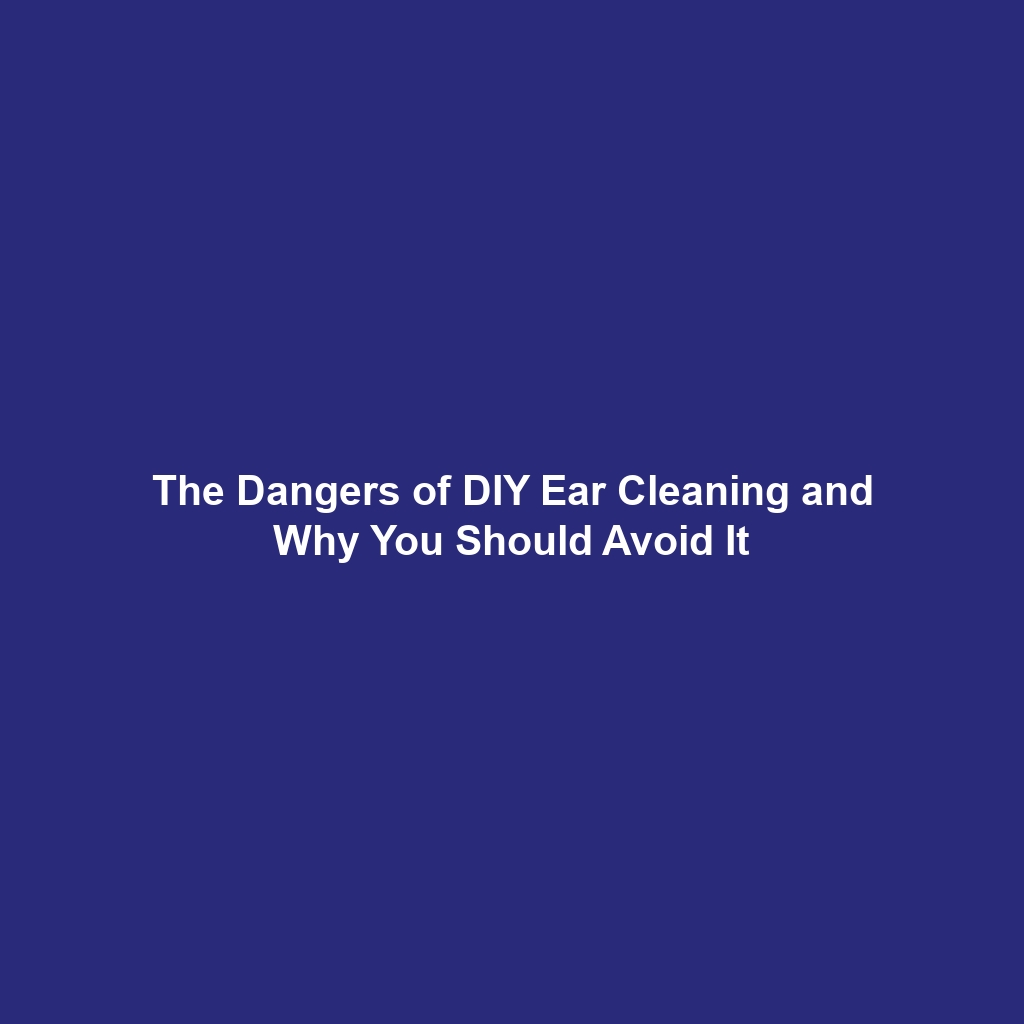Introduction
When it comes to personal hygiene, many people often think that DIY solutions are the best route. After all, who doesn’t love saving a few bucks while feeling empowered by handling their own health issues? However, when it comes to ear cleaning, the dangers of DIY methods can outweigh the benefits significantly. This article will explore The Dangers of DIY Ear Cleaning and Why You Should Avoid It, revealing the hidden risks associated with improper techniques and the importance of seeking professional help.
Understanding Your Ears: Anatomy and Function
https://www.deafinfo.org.uk/2025/01/14/why-you-should-consider-ear-wax-extraction-near-me/
The Structure of the Ear
Before diving into why DIY ear cleaning is risky, it’s essential to understand how our ears work. The human ear consists of three main parts: the outer ear, middle ear, and inner ear. Each section plays a crucial role in hearing and balance.
- Outer Ear: This includes the visible part (the pinna) and the ear canal leading to the eardrum.
- Middle Ear: Home to three small bones (ossicles), this area amplifies sound vibrations.
- Inner Ear: Contains the cochlea and vestibular system responsible for hearing and balance.
How Earwax Functions
Earwax, or cerumen, serves several functions:
- Protects against dust, debris, and microorganisms.
- Helps lubricate the ear canal.
- Provides a natural antibacterial barrier.
The Risks Involved with DIY Ear Cleaning
Increased Risk of Infection
One major risk associated with DIY ear cleaning is infection. Introducing foreign objects or substances into your ears can lead to serious issues. For instance:
Infections can cause pain, swelling, and even temporary hearing loss.
Potential for Injury
The ears are sensitive structures; attempting to clean them yourself can result in injury:
- Puncturing the eardrum due to excessive force.
- Scratching or damaging the delicate lining of the ear canal.
These injuries may require medical attention from an otologist in Watford or other specialists.
Why Professional Help Is Essential
Expertise Matters
When it comes to ear cleaning services like micro suction Watford or ear syringing in Watford, professionals have training that ensures safe procedures:
Effective Techniques
Professionals employ techniques like microsuction or irrigation that safely remove wax build-up without causing harm:
- Micro suction involves using a small vacuum-like device.
- Ear syringing flushes out wax with sterile water.
Both methods minimize risks associated with home remedies.
What Are Common Symptoms Indicating You Need Professional Help?
If you experience any of these symptoms, it might be time to consult an expert:
Ignoring these symptoms could lead to more severe complications requiring extensive treatments like ear wax removal in Watford or even surgical interventions.
Alternatives to DIY Ear Cleaning Methods
Safe Home Practices for Ear Health
While you should avoid invasive cleaning methods at home, there are safe practices you can adopt:
Regular Check-ups with Professionals
Scheduling regular check-ups with an otologist in Watford can help maintain good ear health:
- They can assess any wax build-up effectively.
- Provide preventive advice tailored to your needs.
Understanding Wax Build-Up Treatment Options in Watford
Professional Removal Techniques Available Near You
If you’re struggling with excessive wax build-up, consider these options:
Ear Wax Microsuction Watford: A popular method among healthcare providers allowing for precise removal without harming surrounding tissues.
Ear Wax Suction Watford Near Me: A convenient service offered by various clinics where trained professionals use gentle suction devices.
Ear Syringing in Watford: This option involves flushing out excess wax but should only be performed by professionals due to potential risks involved if done incorrectly.
Signs You May Have Excessive Ear Wax Build-Up
How do you know if you have too much wax? Here are some signs:
- A feeling of fullness or blockage in the ears
- Decreased hearing ability
- Ringing sensations (tinnitus)
If you notice any of these symptoms, it’s crucial not to attempt removal yourself but rather seek professional help from local services like help for blocked ears in Watford.
Frequently Asked Questions
1. Can I use cotton swabs for ear cleaning?
Using cotton swabs is discouraged as they often push wax deeper into the canal instead of removing it effectively.
2. How often should I get my ears checked?
It’s recommended to have your ears examined at least once a year unless you experience problems earlier.
3. What should I do if I feel pain in my ears?
Consult a healthcare provider immediately if you experience persistent pain; this could signify an underlying issue needing attention.
4. Are there any home remedies considered safe?
While wiping around your outer ear is generally considered safe, deep cleaning should be avoided entirely; always consult professionals for internal issues!
5. How does microsuction differ from syringing?
Microsuction uses gentle suction for precise removal while syringing involves flushing out wax with water—each method has its benefits depending on individual cases!
6. Where can I find help for blocked ears in Watford?
You can search online for local clinics offering specialized services such as earwax suction watford or visit health directories listing certified practitioners nearby!
Conclusion
In summary, while the idea of managing your own health care sounds appealing—especially when it comes down to something as seemingly simple as ear cleaning—the reality is fraught with potential pitfalls that could lead to severe complications! Understanding exactly why “The Dangers of DIY Ear Cleaning and Why You Should Avoid It” cannot be overstated; proper care requires knowledge about anatomy combined with skillful techniques only professionals possess!
So remember folks: when it comes down to keeping those precious auditory organs healthy—stay informed! Seek help from local experts like ear doctor Watford right away if concerns arise! By prioritizing safety over convenience today—you’ll ensure clearer hearing tomorrow!
